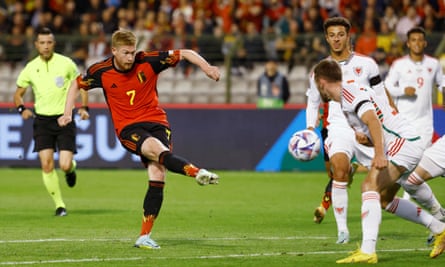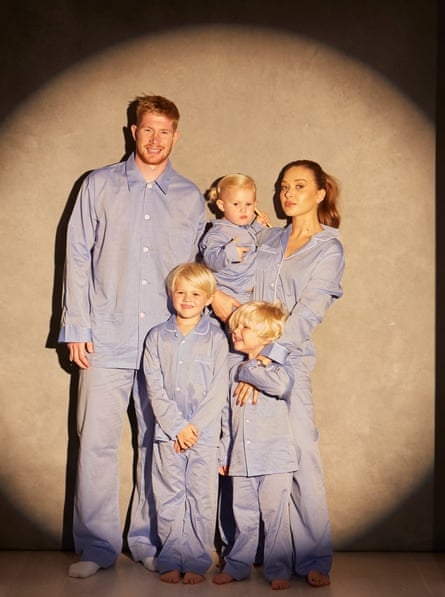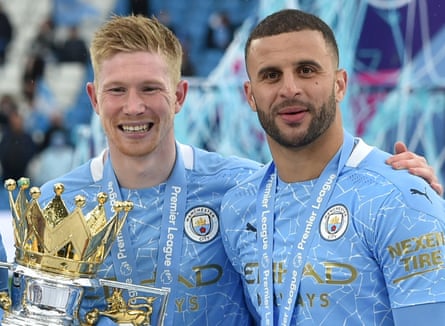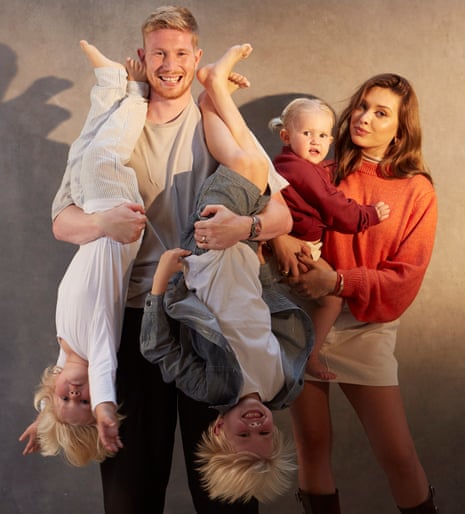Confession. I’m a Manchester City fan. Another confession. Kevin De Bruyne is my favourite player. In 30 years of journalism, I’ve never interviewed a City player. Don’t meet your heroes, they say. The whole thing is discombobulating. De Bruyne – one of the world’s great players – has agreed to a rare interview. But there’s a caveat. If you talk to me, he says, you also talk to my wife, my kids, you do it at our home and you get to know us all. Usually, it’s the opposite – you don’t talk to my family, you don’t come to my home, it’s all about the work rather than the private life. Strange.
We meet a few weeks before the start of the World Cup. He’s beginning to think about it. But in typical De Bruyne fashion he dispenses with diplomacy and tells it as it is. No, he’s not happy about it being in Qatar. Yes, it is a distraction from the Premier League. No, he doesn’t think Belgium have much chance of winning.
Now he’s out there hoping to prove himself wrong.
At his best on the pitch, virtually everything is channelled through him. Often he will start a move by winning the ball and running with it in the same movement. Though he plays in the centre, he sets up goals by overlapping on the wing to put in crosses of such pace, swerve and accuracy that they are impossible to defend. And while goal-scoring isn’t his main thing (he prefers to assist), last season, when he scored four goals against Wolves, commentator Alistair Mann quivered: “Kevin, stop it! I’m running out of superlatives for you!”
In 2020, De Bruyne became the first City men’s player to win the prestigious PFA Player of the Year, and won it again the following season. In September, he was named the world’s best passer in the video game Fifa 23. Earlier this month, the game Football Manager 2023 ranked him the greatest player in the world.
De Bruyne doesn’t run with the football pack. We never see him out getting into trouble. In fact, we pretty much never see him. Which makes today even stranger. But it also makes a kind of sense. “Away from football, it’s all about family,” he says. “This is my life.”
Michèle Lacroix, AKA Mrs De Bruyne, greets me at the door. She apologises for still being in her bathrobe, shows me in and makes coffee. The house is everything you’d expect: huge driveway, extension the size of a small hotel, artworks galore, carpets like quicksand. Coco, the white-grey cat, is so perfectly coordinated, you wonder whether she came with the furnishings. Yet it’s also homely. Toys spill out of the playroom and De Bruyne’s office obviously doubled up as the home-schoolroom in the pandemic (one wall is plastered with spelling tests).
De Bruyne is nowhere to be seen, so Lacroix introduces me to Coco, the three children and her mother. We chat and drink, and it’s only after a while that I realise De Bruyne is also now in the kitchen. He is wearing a brown tracksuit, has a wispy gingerish beard and bears more than a passing resemblance to his cartoon compatriot Tintin. He glides through his house like a ghost: if he hadn’t shaken my hand and introduced himself, I probably wouldn’t have registered his presence. He floats off to the fridge, takes out slices of white Hovis, makes himself a mustard sandwich, heats up green soup and starts eating. All without a murmur. De Bruyne is a paradox. He is both famously shy and famously outspoken. A number of stories shape the mythology around him. The first is that at eight he turns to his father and says he wants to leave his club, KVV Drongen, because the training sessions at Ghent, another local club, are better. Second, now playing for Ghent, he gets so enraged when told off for not helping to clear up the pitch that he grabs one of the posts and refuses to let go. Three adults try to pull him away but fail, and his coach, Frank De Leyn, has to stay with him because De Bruyne tells him he is planning to hold on all night.
Fast forward a few years for another classic tale: De Bruyne is on the verge of the first team at rival Belgian club Genk, living there with a foster family during the week, when they decide, two years in, that they don’t want him to live with them any more because he doesn’t fit in; he’s too quiet. Finally, there is the time, aged just 20, when he gives a half-time interview ripping into his Genk teammates for shirking: “I’m ashamed of them. I suggest that those who don’t have a desire to play just leave,” he says at the time.
His management team are also here today and he’s talking to them in a quiet, flat voice. It’s so understated you almost tune out. Then you hear what he’s saying. Asked if Belgium can win the World Cup, he says, “No chance, we’re too old.” It’s only seven months ago that Belgium were ranked No 1 in the world. De Bruyne says that because the tournament is being played in Qatar in mid-season, it doesn’t feel like a real World Cup. One of his reps says it must be a dream playing with Erling Haaland, the extraordinarily prolific striker at City. “Ach, it’s like any forward.” Even he thinks his response is underwhelming. “He is so quick, though,” he adds.
He finishes his soup, cuts up some blackberries and grapes for baby Suri, who is sitting in her highchair having her hair primped for the photoshoot. He says his childhood was so different from that of his children. His father worked in a factory painting trains, his mother was a housewife, and he describes his background as “lower-middle class”. What was he like at school? “I was OK. Smart enough to know how much I needed to do and to finish it. I left at 18 with a diploma.”
I ask why so many European footballers seem better educated than their British counterparts. Perhaps the difference is languages, he says. “There are a lot of people from different countries who speak two or three languages, where English players usually only speak English. I come from a country where by 13 you are studying Dutch, French and English.” With languages, perhaps comes wisdom and humility – an ability to put yourself in the shoes of others, a knowledge that your way is not the only way. He smiles. The Belgian way was never going to be the only way, he says. “Everybody in Belgium always watches English TV anyway!”
I tell him I recently watched footage of him playing as a young boy and his style has hardly changed. Even if you blocked out his face, it could only be De Bruyne. “I know!” He takes out his phone and compares two photographs. “This is from a couple of months ago when I scored against Bournemouth. Look at the way I kick the ball. And this is a picture of me shooting when I was a kid. Identical! Same technique!”

Are Mason, six, and Rome, almost four, promising footballers? “No,” he says. “They don’t play.” Are they not interested? “I don’t know,” he says, as if he’s never considered it. “They like to go to the football. My oldest plays piano a bit and likes to run. He’s a good runner.”
I ask about the famous stories. Did you really cling to the goalpost and refuse to budge? “I think the stories are a bit made up.” So it’s not true? “I don’t remember it. It could be true!” Does it sound like him ? He grins. “I was a little bit stubborn, yeah. I let most things go, but when I do say something I am outspoken. I know now when you speak as a teenager or a kid to an adult with an opinion, people don’t like it … even if it’s true.”
Was that the case when you suggested your Genk teammates were not trying? De Bruyne pinkens. He often flushes like this – when he’s embarrassed, when he’s upset on the pitch and when he’s made one of his superhuman runs. “Yes! The problem is the fans like that and other people like that, but the team doesn’t.”
A hairdresser is here to give everyone a trim before the photoshoot. While it’s De Bruyne’s turn, I chat to Lacroix. She’s a model, a social influencer (with more than 350,000 Instagram followers) and she recently started a Flemish podcast called Secret Society with a few Belgian girlfriends. Her parents are physiotherapists and she wanted to be a doctor when she was at school. “I never thought my life would look like this. Getting a degree was my main goal then.” When she was 17 and De Bruyne was 21, they started dating. Apart from it being her husband’s career, she has no interest in football and certainly had no ambition to be a footballer’s wife. Can she see what makes him a special player? “I don’t know a lot about football, but I think he sees things before the others maybe. He’s always one step ahead?”
She’s encouraging Suri to finish her fruit. “Everyone thinks she’s called Surrey,” she says. “‘Ello, Surrey!’” She does a good impression of a cockney. Rome is building a racetrack on his mini computer. He shows me how to do it, but I can’t keep up. Mason asks for a go of my tape recorder. “I’m going to interview you. What’s it like working for media? What’s your favourite colour?”
De Bruyne emerges from his haircut looking pleased with himself. “I’m like 24 now! I could be a model!” We head back into his office and he and Lacroix sit together on the sofa. I ask her how life has changed since they got together. For starters, she says, they weren’t living anywhere like here. Back then he was just making a name for himself and they could pretty much do what they wanted socially. “Football-wise, it’s got better and better. But then we could do more normal stuff. On a city trip, say, maybe two or three people would come up to us. Now we’re more isolated. So you do more things at home with friends. Kevin has grown more open because we’re in such an intimate circle, always with the same group. He’s more comfortable with who he is.”
“I’m more open-minded to life,” De Bruyne says. “When I was younger, it was just football. Now I have a family, life is different.” In fact, he says, it’s remarkably similar to many other working people – he drops the kids off on his way to work, trains, comes home, family meal with the kids, helps with the homework, watches telly.
He admits there is one way their life is noticeably different from the rest of ours – they spend more money on stuff. This is partly because they can and partly because they pay extra to buy their privacy. “We have to live our life in a more secluded way. Often, if we go on a tour it will be a private tour, and most of the time this stuff is more expensive and more individual.”
Lacroix says this is not a choice. When she and the kids go out without De Bruyne, they can do whatever they want. But with him it’s a different story. “Yesterday we thought we’d try going to the fair and Kevin made at least 100 pictures. Maybe 150. And the kids had to wait all the time, and it wasn’t enjoyable for them. At one point security came up and we thought they’d help, then they said, ‘Can we have a picture?’” She laughs.
She’s not asking for sympathy, she says. In so many ways it’s a wonderful, privileged life. But it isn’t without problems. “When I’ve been driving to the club lately,” De Bruyne says, “there have been people driving next to me and filming. People have followed me.”
After games, Lacroix adds, “People just jump in front of the car so you can’t drive. Then the one next to them goes for a picture so you can’t go anywhere.”
Top footballers get paid ludicrous salaries and are idolised by their supporters. De Bruyne is City’s best-paid player, earning an estimated £385,000 a week – £20m a year. In 2020, he cut ties with his long-term agent, Patrick De Koster, after he was arrested on suspicion of fraud. The investigation was reportedly triggered by complaints from De Bruyne himself. Last year, he negotiated his own contract extension using data analysts to prove his worth to the club.
All the money and worship must change you, I say. “I don’t necessarily think it’s the money, it’s the attention. If you go from no attention to wherever you go people give you attention, then that changes you. You either take everything in or block everything out. Some people like all the attention, but after a while it becomes so much you get eaten up by it. Then if you push it out you seem arrogant. It’s a thin line you have to walk.”
In terms of attention, he says, it’s harder for the top English players: “Because I’m a foreigner living here, I’m still OK. When you’re an English player, the attention flows from everywhere. It would be too much for me.”

Does he think he gets paid too much? “No. I compare it to a singer at a concert and 60,000 people come. I look at it logically. There are millions of people watching the football on TV, there’s 60,000 watching the games, the income of a club is £500-£600m. Yeah, it’s a lot of money, but is it too much? If the club can afford it, it’s not too much. It’s not a popular answer, but that’s how I see it.”
How hard is it for them to relate to people struggling with the cost of living crisis? “We are really close to our family and friends, and most of them have normal jobs, so we know the struggles,” Lacroix says.
She looks at De Bruyne and asks him to translate an expression. “We stay with our feet on the ground,” he says. “It’s easier for us to understand, but it will be harder for the kids because they’re used to a certain lifestyle. They go to a private school and there are people from similar backgrounds. They understand when we go to see our families it’s different types of houses and another lifestyle.” It worries him: “We’ll try, but it cannot be the same as when we grew up. It’s not possible.”
When he was a child, he says, his parents didn’t have much, but it was plenty: “We had what we needed; a nice garden.” Does he have siblings? “One sister. She did trampoline and was pretty good at it. But she didn’t have the character to go on like I did.”
So many promising footballers fall by the wayside. Fewer than 0.5% of the kids in English academies at the age of nine make it as professionals at any level. So what is character? “It’s will. It’s saying no to fun stuff. At 17, 18, a new social life is beginning, people are going out, having fun with friends, and you have to say no.” That must be hard? “It is, and that’s why many people fall down at that stage. You have to become an adult quickly in football. When you start playing with the first team, you’re living with 30-, 35-year-olds; people with kids. It’s not easy and you need to learn that quickly, because if you don’t, you fall out. Elite sport is brutal.”
Did he find it tough as a teen? “Yes. I also missed part of my life because I went away from 14. We’d play on a Saturday, then I would go home to see my parents and on Sunday evening I’d travel back. So I missed the whole social part of my life.” Was he jealous of his friends? “Not at that time. Maybe afterwards. Later, when you experience things, you think perhaps it would have been fun to be doing this when everybody else was.”
It was his decision to leave home at 14: he was desperate to play football, and his parents were supportive.
I ask if the story about being dumped by his foster family is true. “Yes,” he says. “There were three of us and the other two were more sociable. At summer break I said bye to the family and went home. Then my parents told me, you’re not going back, they don’t want you any more.” He says the foster family never said anything directly, but told his parents they didn’t want him because he was too quiet, too difficult, a teenager who didn’t fit in. To add insult to injury, Genk told him he had to go to boarding school instead. In Belgium, boarding schools are more for problematic than privileged students. “I really didn’t want to do it.”
Did that rejection make him question his character? “No. I thought I’m going to push more and show them. I said to my parents, I will do good, you’ll see. I’ll be in the first team quickly, then everything will change.”
There is a YouTube film about De Bruyne that depicts his life as a triumph over tragedy. “Right from the beginning he was abandoned by his foster family,” it says. “And still life didn’t stop hitting him with tragedy after tragedy.” It goes on to document how the 20-year-old signed for Chelsea in a £7m deal and played only three Premier League games before being sold as a flop.

Has he seen the film? “No.” In the film, it mentions a match in which he came on as a half-time substitute and scored five goals. Every goal, it says, was a way of answering the foster family: “One goal, they don’t want you any more. Two goals, too quiet. Three goals, too difficult. Four goals, they don’t want you any more. Five goals, because of who you are.” When I describe this, he turns a pinker shade of pink. “That’s not true. I don’t know who said that, but it’s not true. I find that a little bit embarrassing, to be fair.” Now he’s laughing. “My life wasn’t that bad, to be honest!”
De Bruyne says too much was made of his time at Chelsea when he left, and too much was made when he returned to the Premier League a couple of years later with Manchester City. “When I came here people said, ‘Chelsea reject.’ No, I was just a young boy who didn’t play and was there for six months. I was really young.”
Leaving Chelsea was the making of him. He signed for Bundesliga club Wolfsburg in 2014 for £18m, ended the 2014-15 season with 16 goals and 27 assists in all competitions and was named Germany’s footballer of the year. In August 2015, Manchester City signed him for £55m. Those who remembered his unhappy time at Chelsea couldn’t believe how much City paid for him. Former Liverpool player Phil Thompson said: “The world is going mad. The amount of money they’re paying for this boy is just absolutely bonkers.” But it turned out to be a bargain. In four of his seven seasons, he has been voted player of the season, and City have won the Premier League four of the past five seasons. In 2017-18 they became the first (and still only) club to get 100 points in a season and the following season won an unprecedented clean sweep of domestic trophies.
Eight months after De Bruyne arrived at City, Pep Guardiola became manager. It was the catalyst for the club’s greatest run in its history. For most of my life as a City fan, I was used to nothing but failure; between 1976 and 2011 the club didn’t win a trophy. Thanks to huge investment from its UAE owners, the signing of great players and arguably the best manager in the world, City have dominated the Premier League for the past decade.
after newsletter promotion

As supporters, I say, we love everything our owners have done for the club, but some/many of us do worry about the UAE’s human rights record. Does it bother him? “Honestly, I don’t know too much about that. All I can say is when we speak to people from the Emirates, they’re all really good and polite. I can only speak highly of them, especially Khaldoon [chairman Khaldoon al-Mubarak]. You speak to him and he’s a normal person.”
I ask Lacroix if De Bruyne finds it easy to turn off from football. “Yes. He comes home and it’s like, ‘Oh my God, I need a break’, so he’ll watch NBA or Formula One. If he’s injured and City plays, me and the kids just leave him alone in front of the television, because when something goes wrong he shouts. I’m like, nothing is going to change, then he shouts at us, and I’m like, OK, let him just watch the game, and after he’s like, sorry!”
De Bruyne has never been sent off for City. But there is a famous clip of him losing it with his teammates at the end of a Champions League match against Napoli in 2017 when he wants to confront the referee. De Bruyne, at his pinkest, shouts “Let me talk” five times. Every time his voice gets louder and more high-pitched. In the end, he sees sense and walks away.
I ask Lacroix to do an impression of him getting angry. “One time when he was injured he threw a bottle of water on the floor with full strength. He couldn’t walk but still managed to get up to the television to shout at it.”
“I just want my team to win,” De Bruyne says meekly.
Suddenly the door bursts open and Spider-Man flies into the room. He removes his head gear, and it’s Mason. “Are you going to answer questions?” Lacroix asks. “No,” Mason says. Is it true you’re more interested in playing piano than football, I ask. “Yes,” he says.
Despite City’s domestic success, they have yet to win the Champions League, the most prestigious club tournament in Europe. How important does De Bruyne think it is? “I don’t think it’s that important. It would be nice, but I think it’s more from the outside. It’s a stick people can beat City with. ‘Oh, you’ve done this but you haven’t done this.’ OK, but we’ve still done really good.”
Who are his best friends at City? “I would say probably Kyle Walker and Nathan Aké.” That’s surprising, I say. Walker seems quite different from you. (Walker was splashed across the front pages of the tabloids after hosting a party with sex workers during lockdown.) “Not really,” De Bruyne says. Is that the media? “I don’t know about media. Obviously there have been issues in the past for him. But from day one I have been close to Kyle and he has three kids and they play with my kids.”

I ask about Belgium’s chances in Qatar, wondering if he’ll be more diplomatic this time. But he’s not. “I think our chance was 2018. We have a good team, but it is ageing. We lost some key players. We have some good new players coming, but they are not at the level other players were in 2018. I see us more as outsiders.”
De Bruyne, at 31, is at his peak. It’s hard to imagine him playing with such pace for much longer. Does he feel it’s getting tougher?
“I am fully able to do what I need to do, but I feel the difference compared with eight years ago. I need more treatment, more rest.”
“When he was younger, the day after a game he’d be like, ‘We can go and play tennis,’” Lacroix says. “Now the day after he’s like, ‘I need to rest. My body hurts.’”
Lacroix says football has brought her the lifestyle she dreamed of. The only difference is she had always imagined she would make her own money. What’s the worst thing about being a footballer’s wife? Often she feels like a single parent, she says. “For example, Kevin has never been to one school nativity. I’m always the parent on their own. It’s rare he can go to something for them. Two of the kids are at school, so we only have weekends to do things with them, but Kevin is playing then. It makes it harder to do stuff together as a family. Kevin always says now we need to be disciplined for football and later we can enjoy everything together.”
Does she think when he retires that will be her time to pursue her dreams? “That’s what everyone keeps saying. But I don’t think so now. I’m devoted to being with the kids, and I’ve just started the podcast.”
“She’s the glue,” he says out of nowhere. Then he looks embarrassed. “I don’t want to say that because tonight she’ll say, ‘My God, look what you’ve said.’”
Lacroix: “No, I don’t do that. I do not.”
“Yes, you would,” he says. “If I said you were the glue to the family, you’d say, ‘Remember you said that.’”
Do you mean Michèle would use it against you?
Lacroix: “Noooooooo.”
De Bruyne: “Of course!”
Lacroix: “He’s making it up!”
They seem to have a lovely relationship.
I ask if he is planning for life after playing? She looks at him, curious to hear the answer: “He gets annoyed when I ask about it. ‘I’m still playing!’”
De Bruyne: “Not really.”
Lacroix: “You do a bit.”
De Bruyne: “Well, I do things to advance the future. I’ve got my Uefa A and B coaching qualification already.”
Does he think he’ll stay in football?
De Bruyne: “Probably, yes.”
Lacroix: “100%. Kevin loves football way too much to not be in it. He should because it’s in his heart as well.”
But he could simply retire, live a life of luxury, make up for lost time on the self-indulgence and dossing front.
“It would never happen,” Lacroix says. “Give him one month, then he would be annoyed. When Covid started he was running around the sofa. I couldn’t cope with him at home.”
They go to have their photos taken. I stay in the office staring at his platoon of man of the match awards. I pop in to see how the shoot is going. De Bruyne is trying to juggle all three children in his arms and I’m worried he may get injured. I’m not sure Pep would be happy.
On the way out, I tell him that at away matches my daughter Maya and I get into the ground early when it’s almost empty and shout for waves from the players when they come out to warm up. Nearly all have given us waves, but never De Bruyne. You’re so intensely focused? “I think so, yes. I’m very different on the pitch to when I’m here. Once I’m playing football it’s a different zone. Then when I’ve finished, the game is done.”
For many years, Lionel Messi and Cristiano Ronaldo were the undisputed two best players in the world. But things are changing. In August, De Bruyne was runner-up in the Uefa Men’s Player of the Year award, won by another oldie, Karim Benzema. How important is it to be regarded as one of the best in the world? The quiet, diffident De Bruyne looks at me with magnificent imperiousness. “It’s not important to be regarded as one of the best,” he says. “I want to be the best.”
The next few weeks with Belgium at the World Cup will provide the perfect stage for him to prove that he is.

Comments (…)
Sign in or create your Guardian account to join the discussion